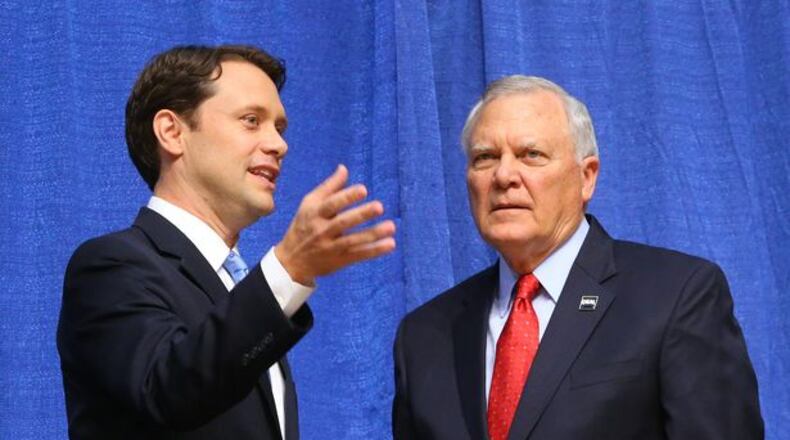It's hard to measure legislative accomplishments solely by the bills passed. But Gov. Nathan Deal and Democratic challenger Jason Carter are locked in a battle over that tricky metric.
Deal's campaign this week said the state senator bats ".000 as a legislator" and attached a list of resolutions - which don't carry the force of law - that Carter successfully sponsored. The takeaway, said Deal spokesman Brian Robinson, is that Carter "stands on sidelines and offers commentary on those who actually lead and get things done for Georgia."
It echoes the attack we heard from Deal over the weekend focused on the 39-year-old Democrat's experience.
Said Deal:
"My opponent has a famous name. I'll give him that. But he wants to be the governor of the state. He's been in the Legislature and the state Senate the same amount of time I've been in the governor. In that period of time he's never passed one piece of legislation. Not one. He complains about budgets that he voted for. And he never offers any amendments to find all these billions of dollars of waste he says is out there."
Not so fast, counters Carter's campaign. They sent over a list of 21 bills co-sponsored by Carter that Deal has signed over the last four years.
Among them are bills that created new mental health courts and changed Doraville's city limits. Most of them would be considered minor, but Carter said that's not the point. He told my AJC colleague Jeremy Redmon he played a behind-the-scenes role in influencing legislation that he knew a Democrat could never get the credit for in a "Washington-style partisan regime."
Said Carter:
"Even when we were reforming the HOPE grant and the governor wanted to take the ideas, the governor still watered them down and made them Republican so he could pass them because he didn't want to give Democrats anything out there. He is running this Washington-style partisan regime. So to criticize me for not having passed legislation in his hyper-partisan regime is baseless.
When pressed for specifics, Carter said he helped ensure that K-12 money wasn't being funneled into private school scholarships and led the Democratic effort to restore eligibility for technical college students who earned a 2.0 grade-point-average to earn the HOPE grant.
"Those are bipartisan movements that matter. And I will tell you -- in that environment -- those kinds of bipartisan successes are very hard to come by. They are very hard to come by and they require real leadership."
Carter's campaign also took a parting shot at Deal's record in the U.S. House, pointing to legislative records showing that the Republican was the lead sponsor on seven bills that passed during his time in Washington.
"And three of them were renaming post offices," said Carter spokesman Bryan Thomas.
About the Author
The Latest
Featured



